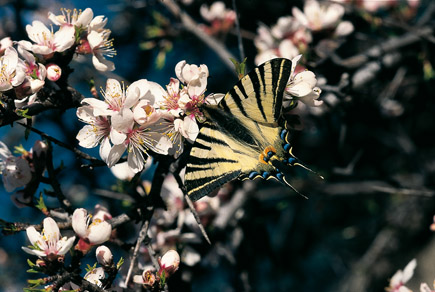
Segelfalter
© EuroNaturEU-commission presents first interim results of “fitness check” +++ EuroNatur calls for better implementation of European nature conservation directives
Press Release, 18 November 2015
Radolfzell. On 20 November, EU environment commissioner Karmenu Vella will present the first interim results of the “fitness check” on the European nature conservation directives at a conference in Brussels. One of the panels of experts instructed by the EU commission has already published its initial conclusions in the run up to the conference. “The experts report confirms our demand that the EU nature conservation directives should in no way be relaxed. Yet that alone is not enough. Because the inadequate implementation of the directives is, as ever, the real area for improvement, mainly because of insufficient funding. In addition to which, there is an urgent need for supplementary measures in other areas of policy. In particular, a much more biodiversity-orientated approach than previously must be taken in agricultural policy,” says Gabriel Schwaderer, head of the international nature conservation foundation EuroNatur, of the interim results of the fitness check.
There has of course been progress in some areas in the implementation of the Fauna/ Flora/Habitat Directive and the EU Birds Directive, particularly with regard to the completion of the Natura 2000 network. Yet many of the Natura 2000 reserves are still mainly paper tigers! In practice there is still a considerable amount to be done. Management plans, for example, have only been drawn up for around 30 per cent of bird reserves and around 40 per cent of FFH areas. In Germany so far, management plans only exist for around every third Natura 2000 area. This implementation of concrete conservation measures is a sure sign in many cases that something is really wrong. EuroNatur believes that this is no surprise: “Europe’s nature can only be protected effectively if money is also provided for nature conservation. A separate fund to finance the designation and management of the Natura 2000 areas is long overdue”, says Gabriel Schwaderer. At present the costs calculated at approximately six billion Euros must be met mainly by the member states, although the EU commission had promised to provide the relevant funding. The member states are not in a position to do this alone. Moreover, this amount is based on an estimate that is now over ten years old, and we must assume that today a much higher level of funding is required. EuroNatur is therefore calling for an earlier demand to be revived: that a separate budget for the management of the European nature conservation network be finally created. For example, by massively increasing the EU LIFE Programme, which has so far only funded a few selected conservation projects. The Natura 2000 network is actually providing a considerable return for the people of Europe in the form ecosystem services (e.g.flood prevention and the pollination of fruit blossom by insects). This is estimated to be worth between 200 and 300 billion Euros a year. The local economy would benefit by between 50 and 85 billion Euros per year from an intact Natura 2000 network.
Together with 19 other member organisations of the European Habitat Forum, EuroNatur has issued a paper stating their position. In this, these organisations call, amongst other things, for nature conservation directives to be not only kept but implemented more systematically in future than they have been until now and for the necessary funding for this to be provided.
Background information:
- The Fauna/Flora/Habitat Directive and the European Birds Directive have been undergoing close scrutiny since the beginning of this year. The EU has itself admitted that it is considering whether the European legislation which is currently in force is suited to achieve the high environmental and conservation objectives of the European Union. The first interim results of the so-called “fitness check” will be presented at the conference on 20 November 2015. Next year the conclusions drawn from these should follow.
- Subject of the conference on 20 November 2015: “Evaluation Study to support the Fitness Check of the Birds and Habitats Directives” by the EU commission’s expert panel
Enquiries: EuroNatur, Konstanzer Str. 22, 78315 Radolfzell, phone: +49 (0)7732 - 92 72 10, fax: +49 (0)7732 - 92 72 22, E-Mail: info@euronatur.org, website: www.euronatur.org,contact: Gabriel Schwaderer, press contact: Katharina Grund


